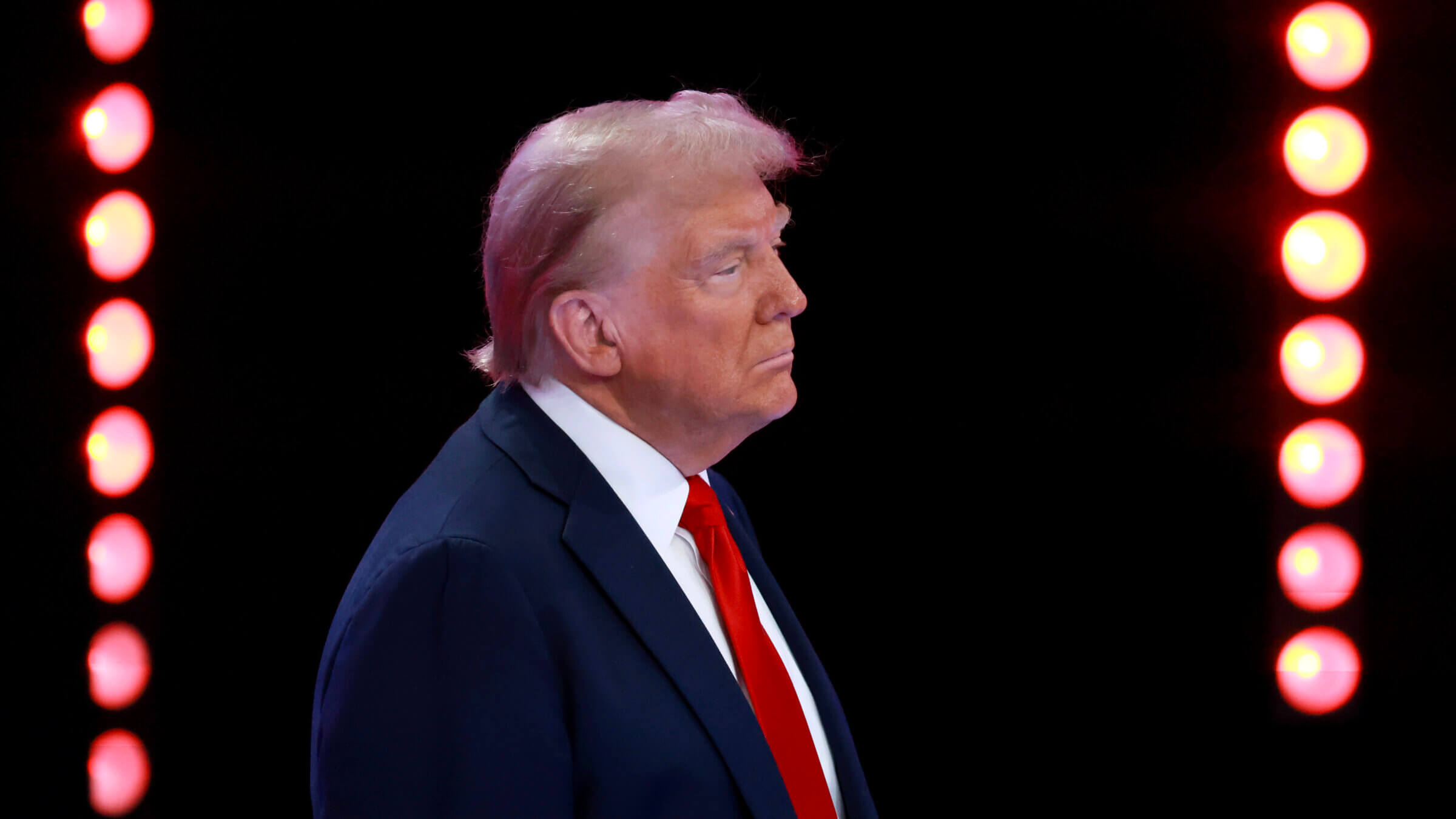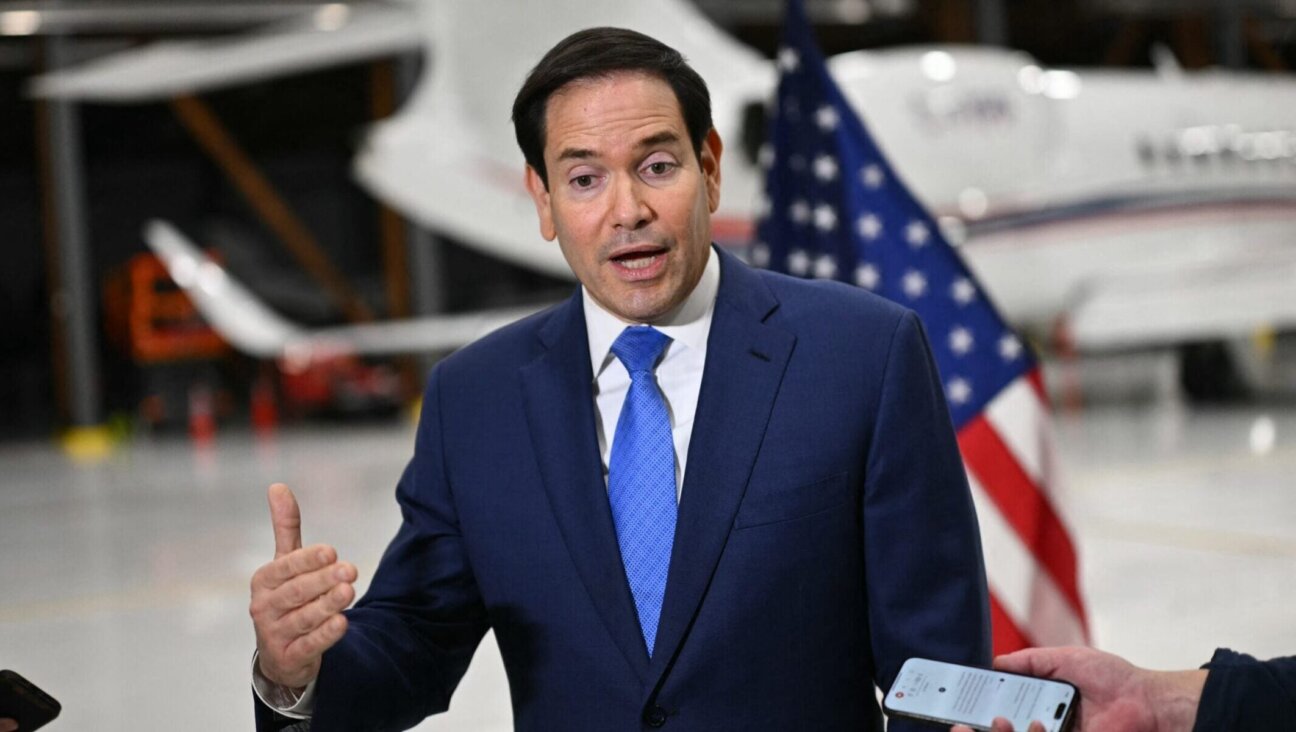Trump wants generals like Hitler’s. Does that make him a fascist?
A historian weighs in on the rise of the F word in American politics

Republican presidential nominee, former U.S. President Donald Trump looks on during a Univision Noticias town hall event on October 16, 2024 in Doral, Florida. Photo by Joe Raedle/Getty Images
In a disturbing interview with the New York Times, Gen. John Kelly said his former boss, President Donald Trump, “certainly falls into the general definition of fascist, for sure.” Kelly, who was Trump’s longest-serving chief of staff, added that he had to coach Trump not say nice things about Hitler.
That news, along with The Atlantic’s report that Trump told a senior aide that he “needed the kind of generals Hitler had,” led me to Omer Bartov, the Israeli-born professor of Holocaust studies and antisemitism at Brown University. Bartov’s 2018 National Jewish Book Award-winning Anatomy of a Genocide: The Life and Death of a Town Called Buczacz examined how fascism can turn neighbors into perpetrators of genocide.
Bartov told me he sees the signs of “proto-fascism” in Trump and his supporters, but stressed that it’s important to pay attention to the one major similarity between German society then and America today: a deep sense of resentment.
“There are large sections of the population in America that simply feel cheated,” he told me. “There is a social and economic malaise in the United States, and Trump is the expression of it, but doing away with him will not resolve the issue itself.”
The following conversation — about whether Trump fits the historical definition of fascism and what his reelection would mean for American Jews and democracy itself — has been edited for length and clarity.
Following The Atlantic’s report that Trump yearned for Hitler’s generals, Vice President Kamala Harris yesterday called Trump a fascist. Do you agree?
What Trump said reflects two things about him. First, ignorance, which is not surprising, and the second is an authoritarian predilection. He obviously doesn’t know much about Hitler, and doesn’t know much about Hitler’s generals.
What doesn’t he understand about Hitler’s generals?
Hitler had some excellent generals in terms of tactics and strategy, and that’s why they succeeded in conquering so much of Europe and large parts of Russia. But those same generals agreed to carry out Hitler’s racial policies. So when you talk about Hitler’s generals, what you’re talking about is generals who made the Wehrmacht into a criminal organization that was directly under the thumb of Hitler. The German army was completely part of the genocide.
So Trump is saying, I want people who will do whatever I ask, no matter what.
That’s why I say it’s a combination of ignorance and authoritarianism. He’s attracted to Hitler because he thinks Hitler was so strong, and he’s ignorant that the army was actually the tool of genocide in Hitler’s hands.
Is it Trump’s way of saying that for him, the supreme virtue is loyalty?
Yes, it is. It’s the Mafia approach. Hitler insisted on a personal oath of loyalty to him that every soldier being recruited to the military had to take. Trump demands complete loyalty and he would turn viciously against anyone who, in his mind, is no longer loyal. It’s not just a fascist thing. It’s really the way that any self-respecting criminal organization works.
Meanwhile we seem to be caught up in this argument over whether he fits the definition of fascist.
There’s some elements that echo fascism. He has a large movement that is not the same as the traditional Republican Party. It is identified with some sort of paraphernalia, hats and all that. It is blindly loyal to him. It’s obviously filled with resentment and rage, which is also part of fascism, and it’s an attempt to really change the entire American political system. But at the most you could say that it’s proto-fascist. There is no real paramilitary organization. I think Trump would like to have those. There is no real ideology behind it, apart from a few slogans. So I think he is trying to create something, but hasn’t created it. It’s by and large an authoritarian, populist, and generally white supremacist movement, although he does have support also from non-white elements in the society.
But there’s another very important similarity between the deeper roots of the rise of fascism and the rise of Trumpism: There’s a major issue of resentment. Large sections of the population feel that they were made promises that were never delivered. There is very nice rhetoric, but social mobility has slowed down or reversed. Then you combine that with fears about immigration, legal or illegal. The Democratic Party has not been able to deal with this,or to even face up to this reality. The Trump movement fit itself directly into that space of people who felt left behind. It is a politics of resentment first of all, and that’s the best way to explain the rise of fascism as well.
I’ve been reading Richard Evans’ book Hitler’s People, where he argues that what made German fascism so dangerous wasn’t just Hitler, but the people around him who used his charisma to enact their own policies and agenda. Should we be worrying less about Trump and more about those around him?
Ian Kershaw, Hitler’s most important biographer, coined this phrase, “working towards the Führer.” Hitler is at the top, he has absolute power, but he’s not a particularly efficient administrator of his power, right? He likes to sleep late. He’s not working around the clock. But his main power is that he can decide which person or which organization can get preference over another. It works especially well when people don’t want to say what they mean. They only want to hint at it. Trump is very good at that. Hitler was very good at that. You don’t want to put down in writing, “You have to exterminate that group.” You say, “You know what we need to do.” People act upon that understanding — that’s working toward your leader. You know generally what the leader wants and what you do exactly, that’s up to you.
So we need to pay attention to the agenda and capabilities of the people around Trump?
Absolutely.
Does a Trump re-election, given these tendencies, pose a unique threat to American Jews?
The short answer is yes. I think it may actually fuel the rise of antisemitism of the real kind. The people who killed Jews were from the Right or fascist Right or Nazi Right. Trump will empower those elements of antisemitism, obviously also of Islamophobia and other types of racism.
Given what you know about the history of fascism, what do we do if Trump is reelected?
One can think, “OK, Trump will be president, and he will be so bad, and the economy will sink so low, and there will be violence on the streets, and then people will realize what a bad choice they made, and they’ll throw him out in four years.” First of all, there’s no certainty that he will leave in four years. And secondly, even if there is an election, there’s no certainty that liberalism will come back.

















